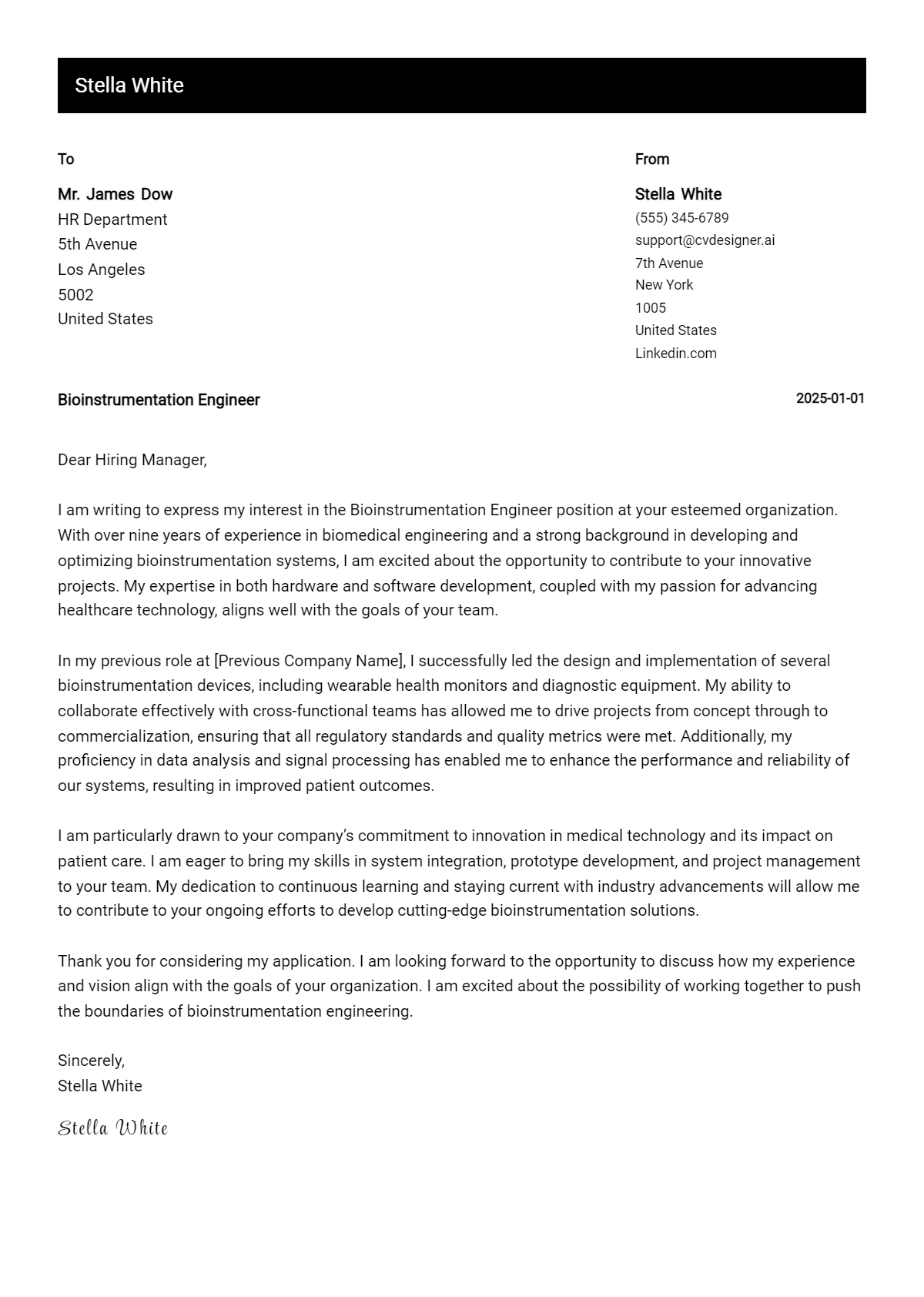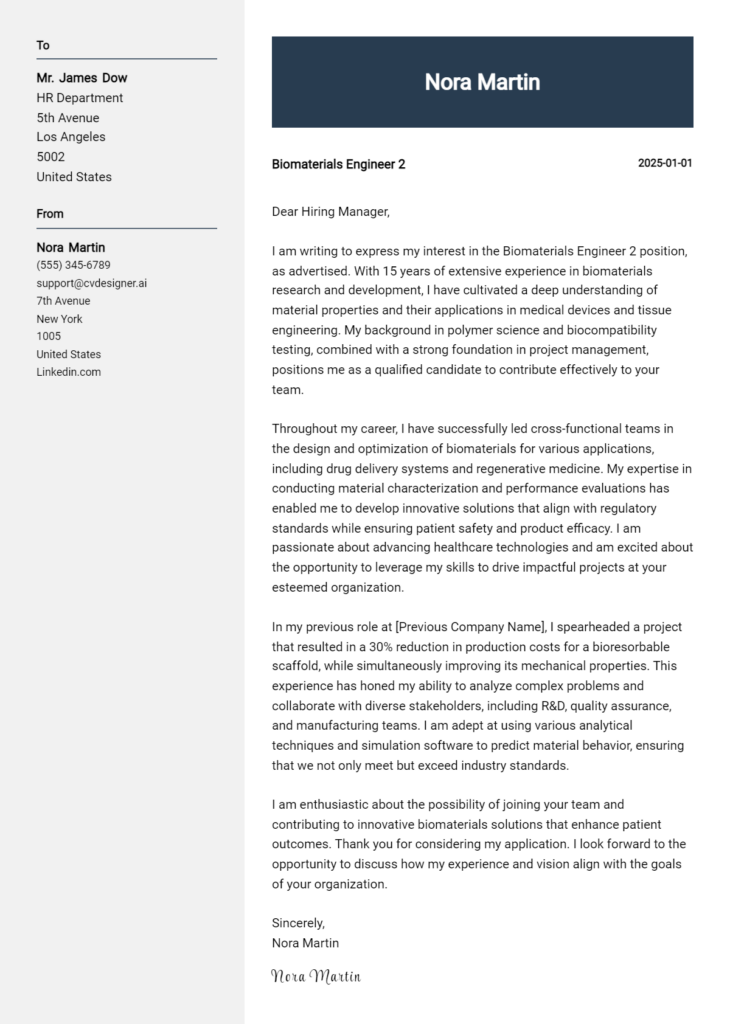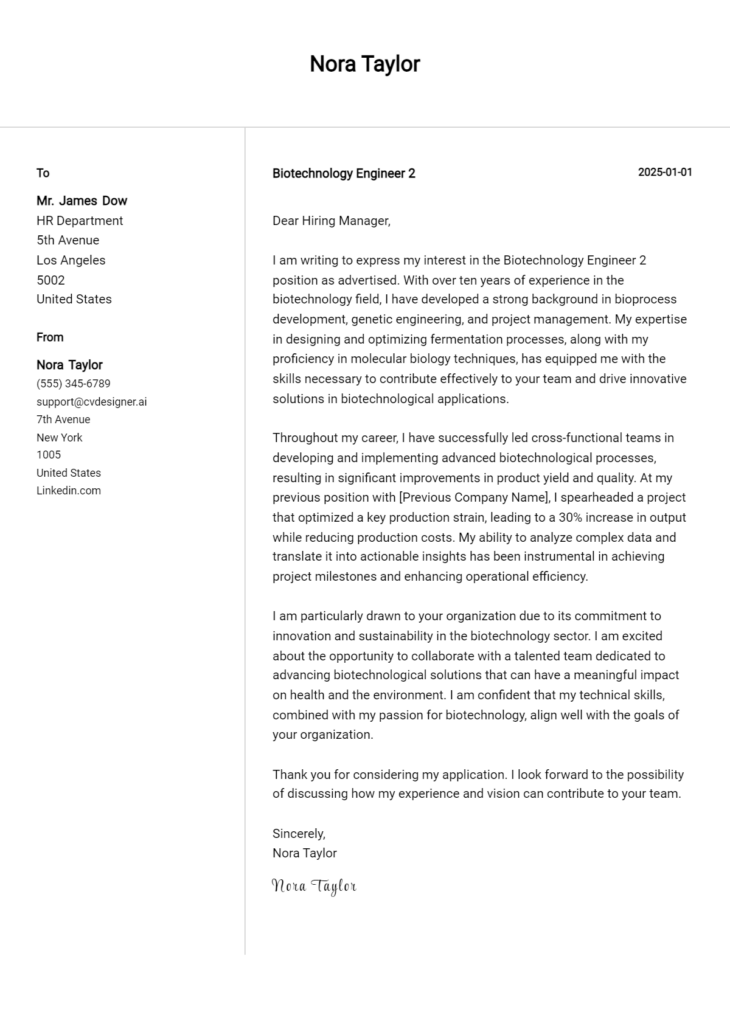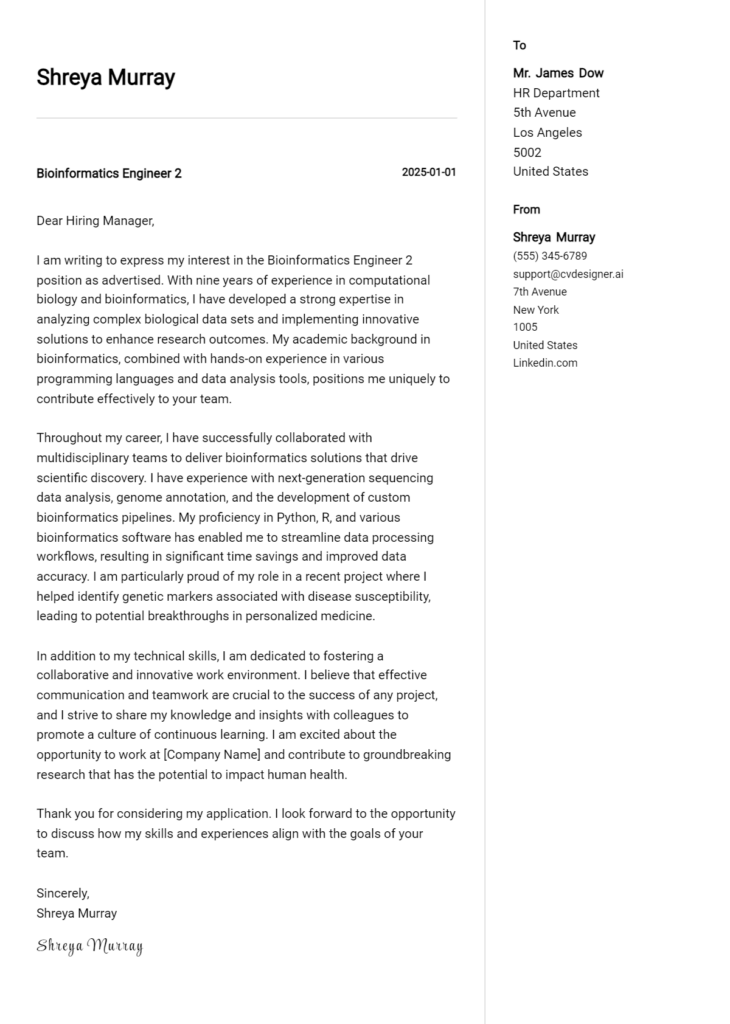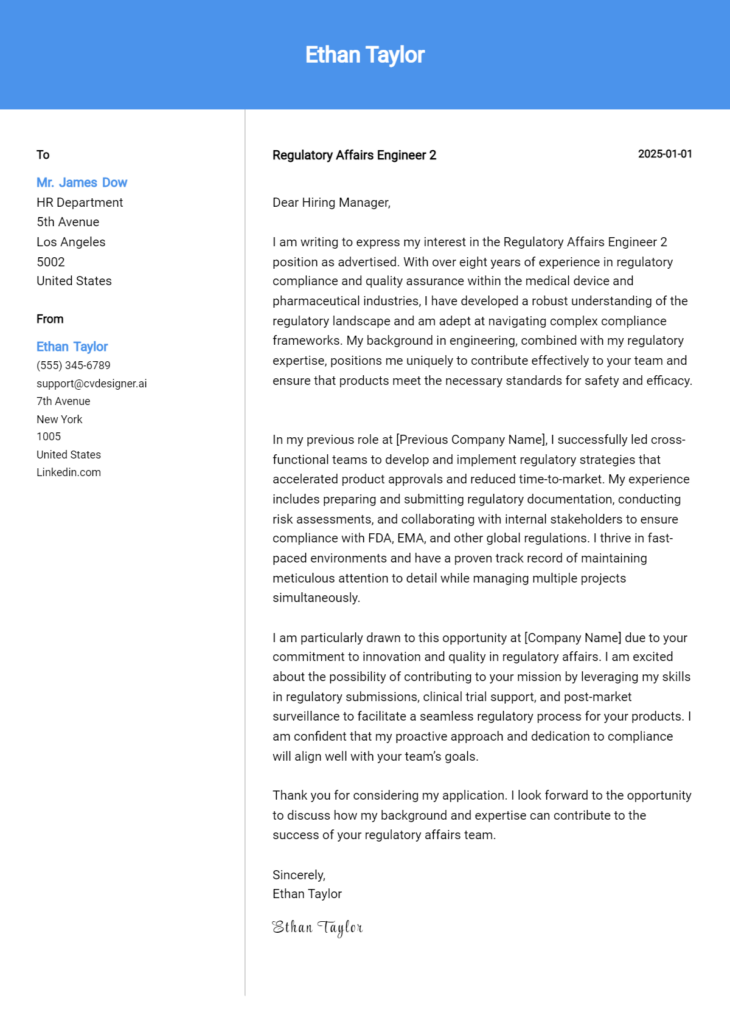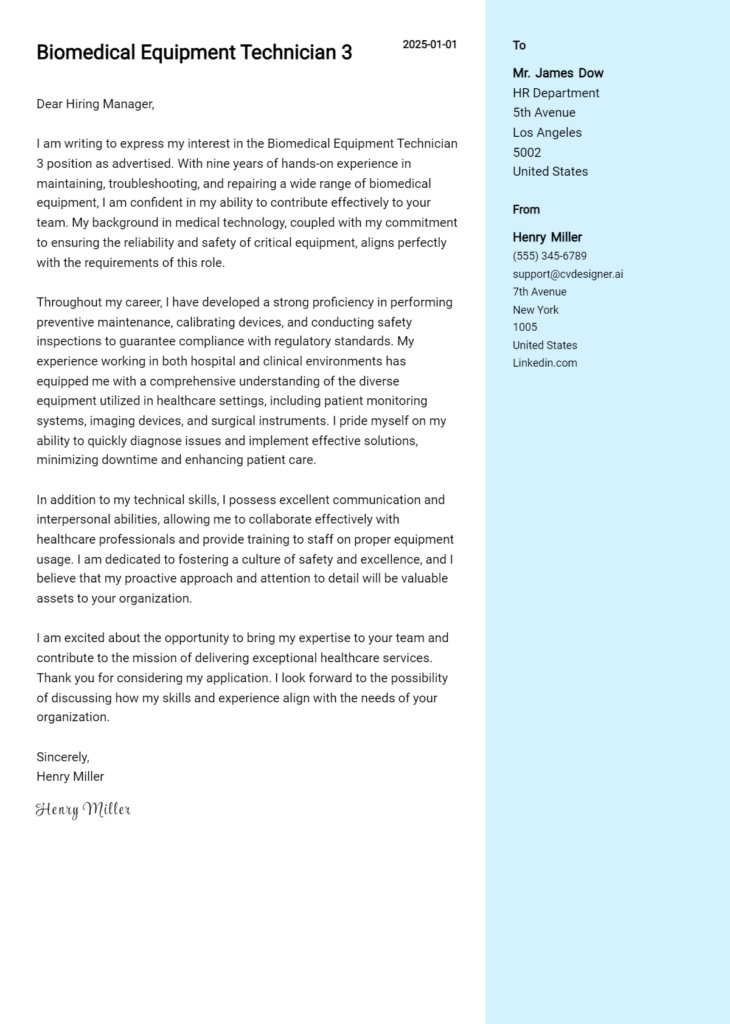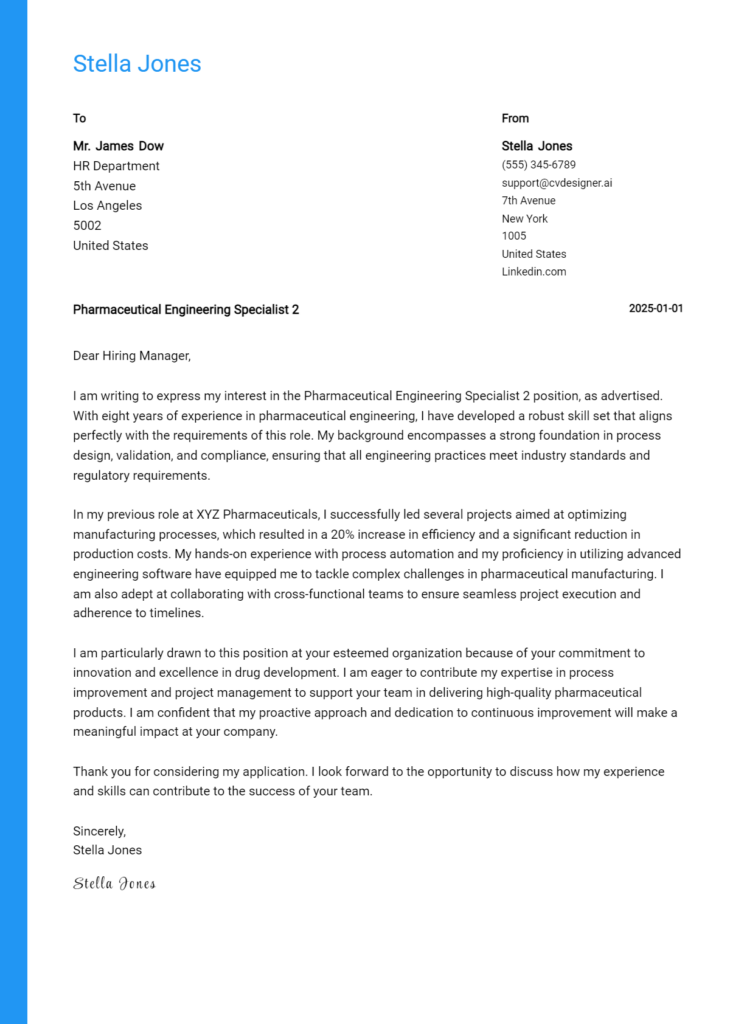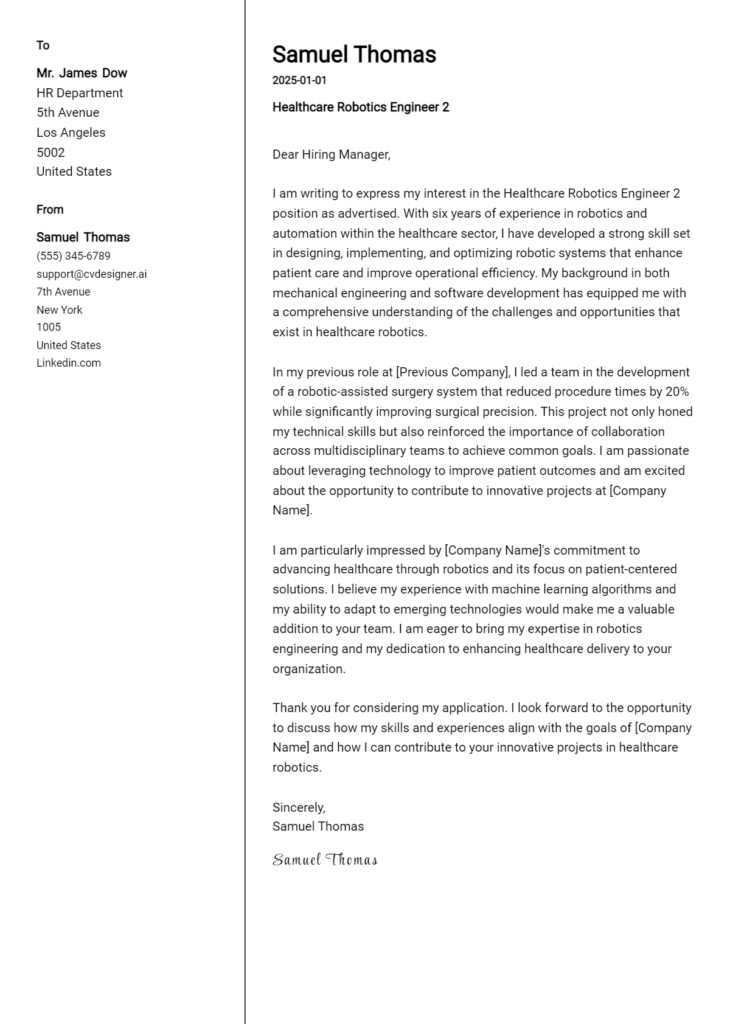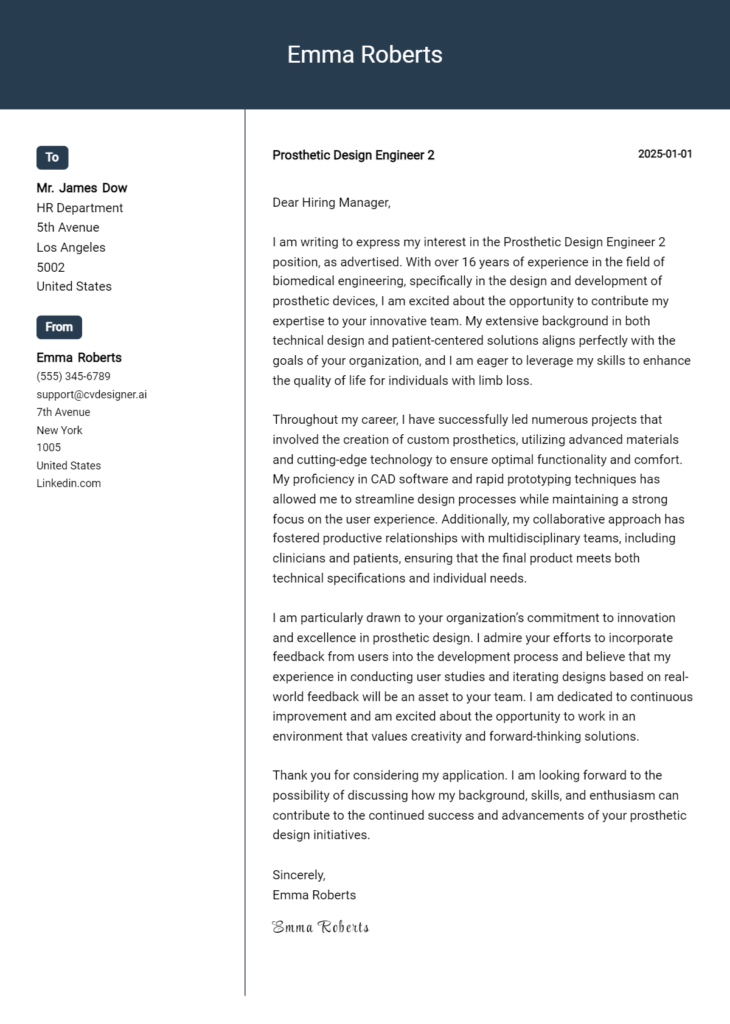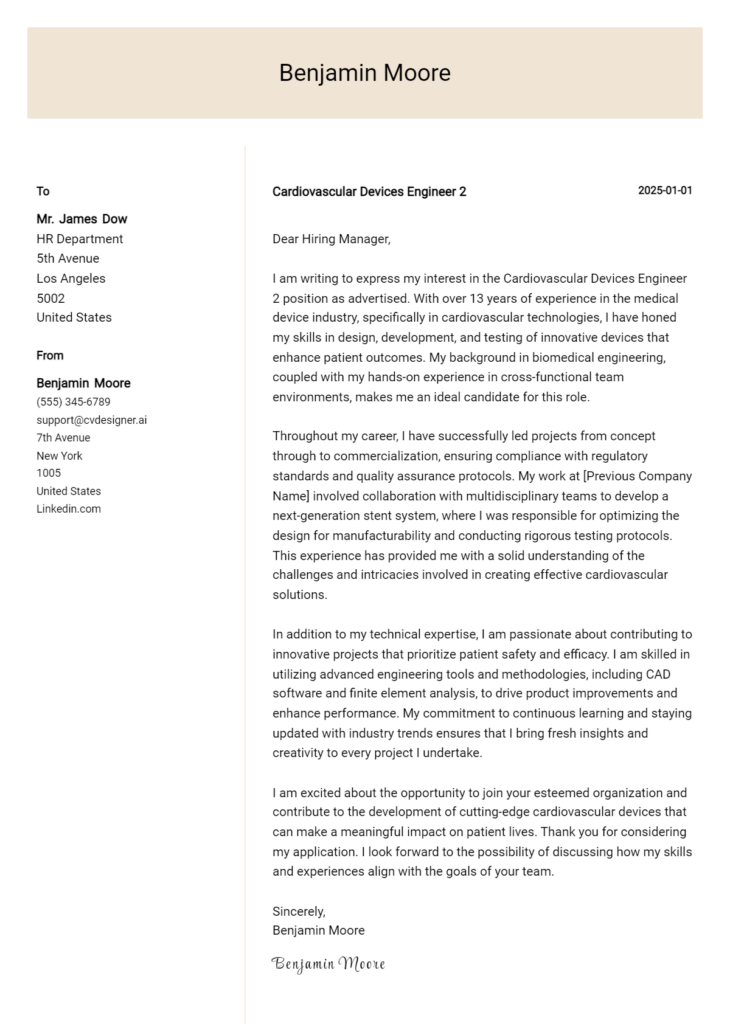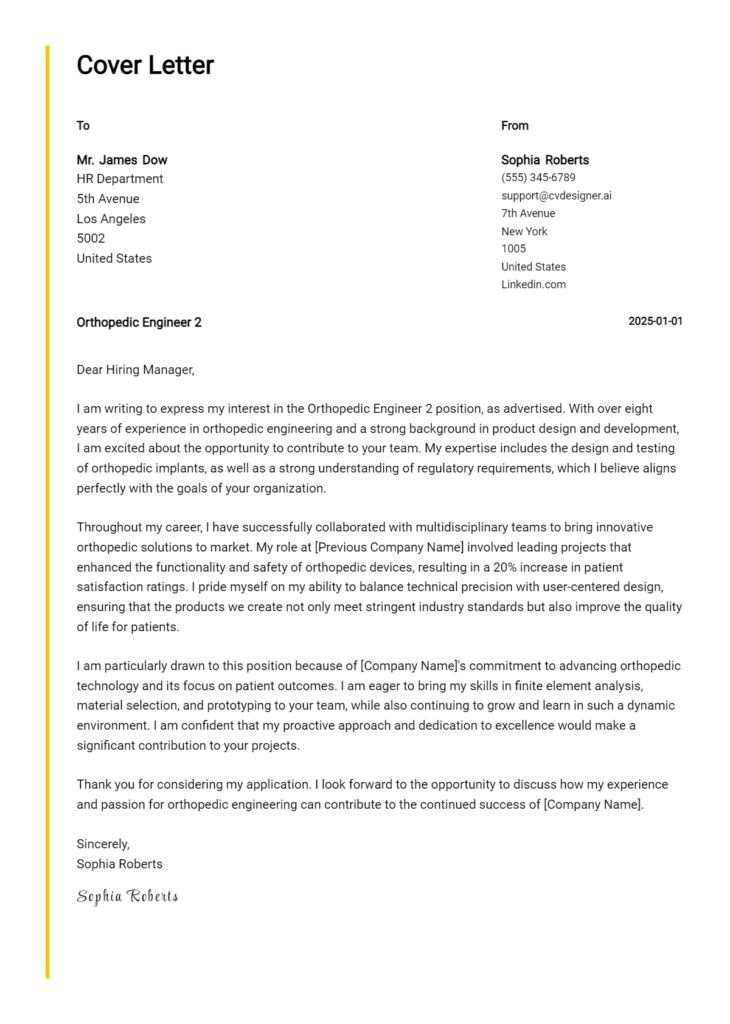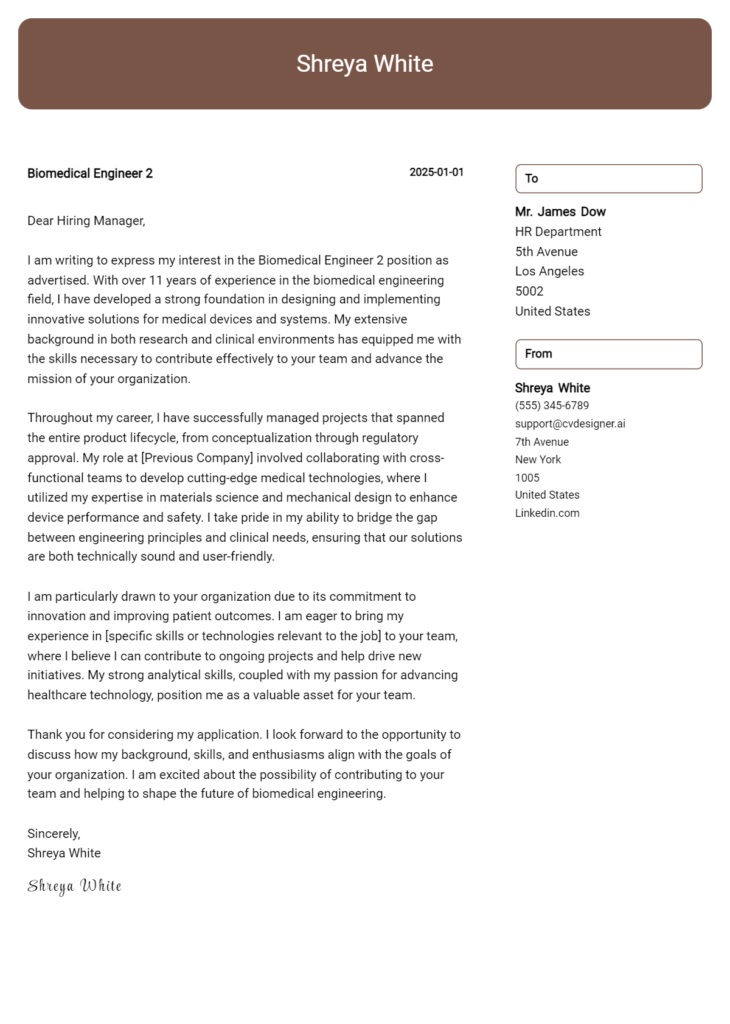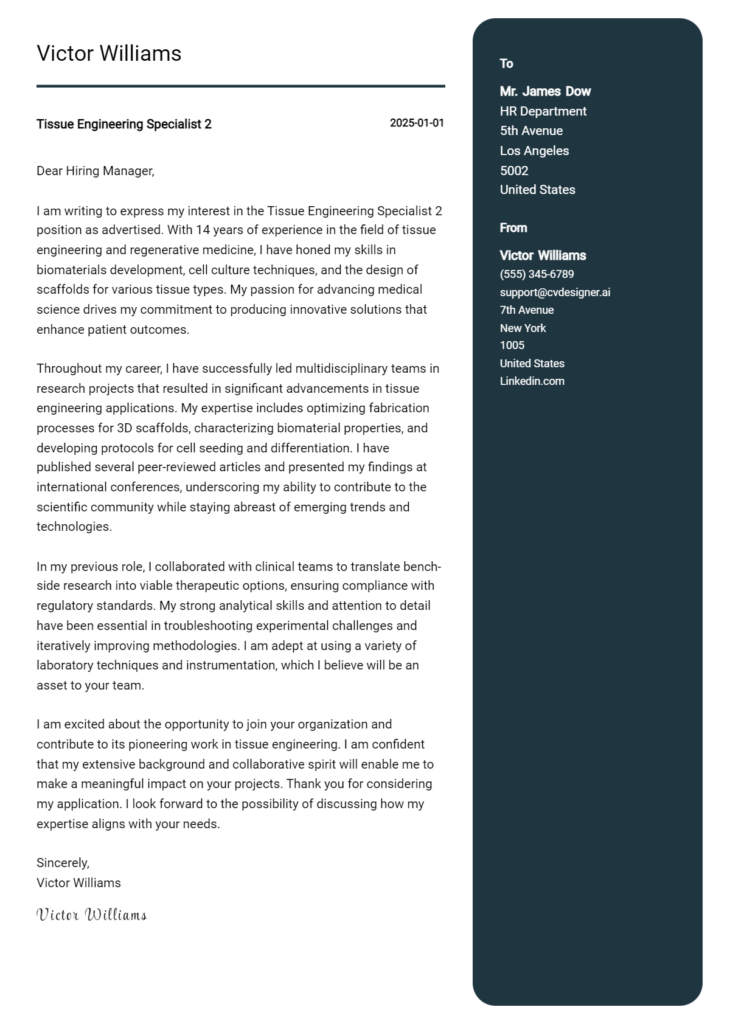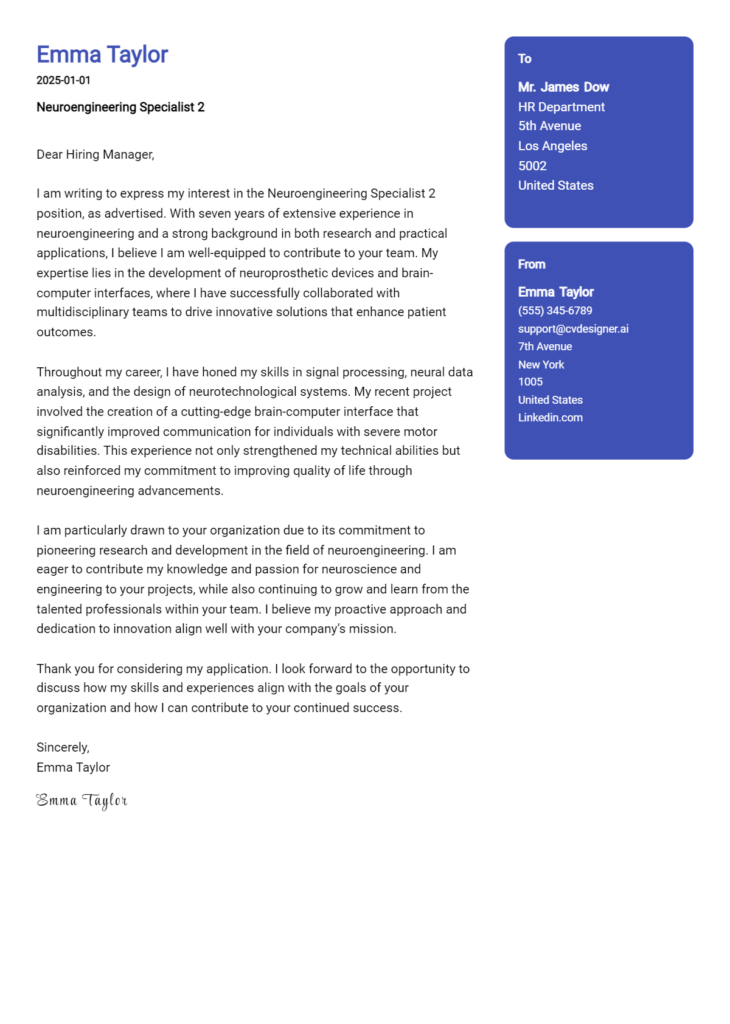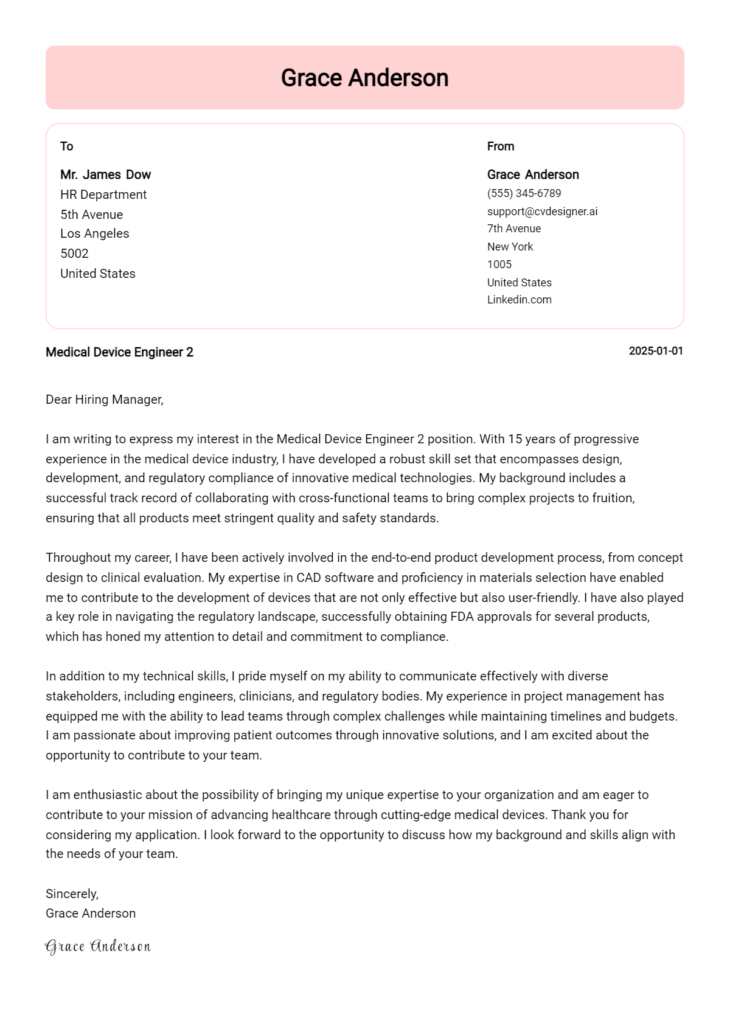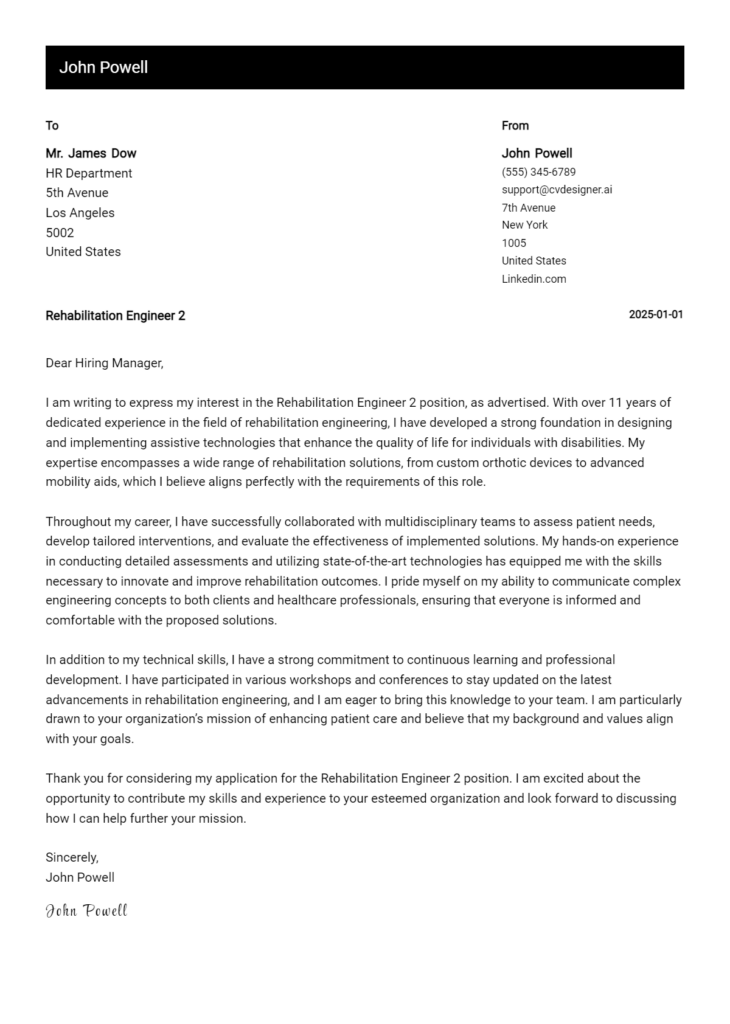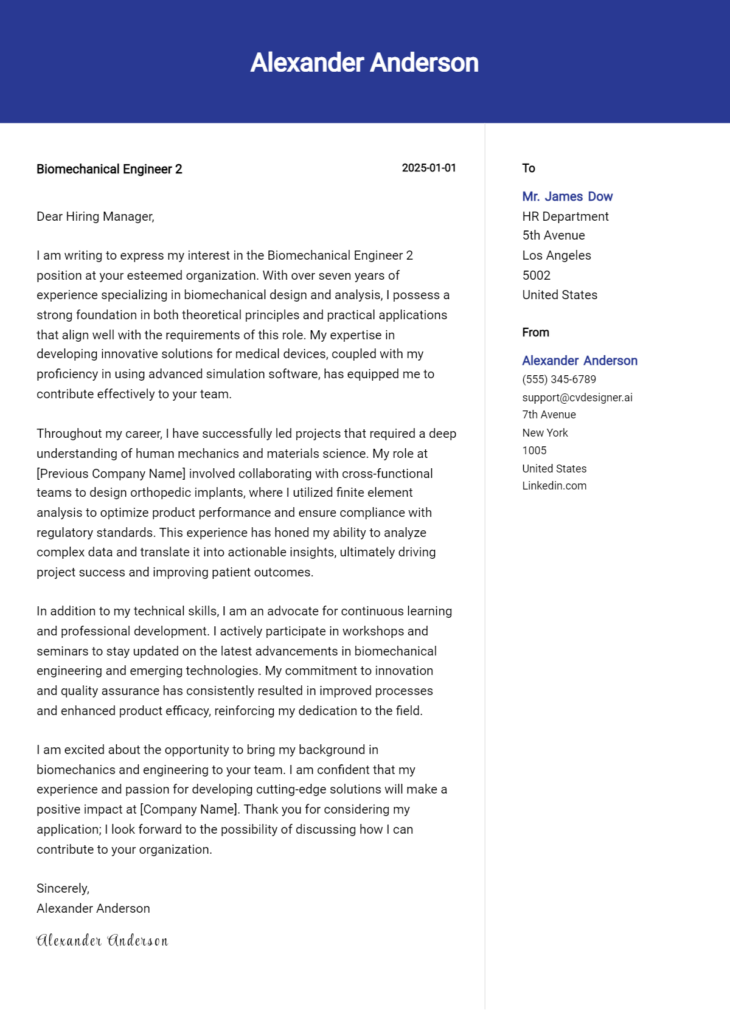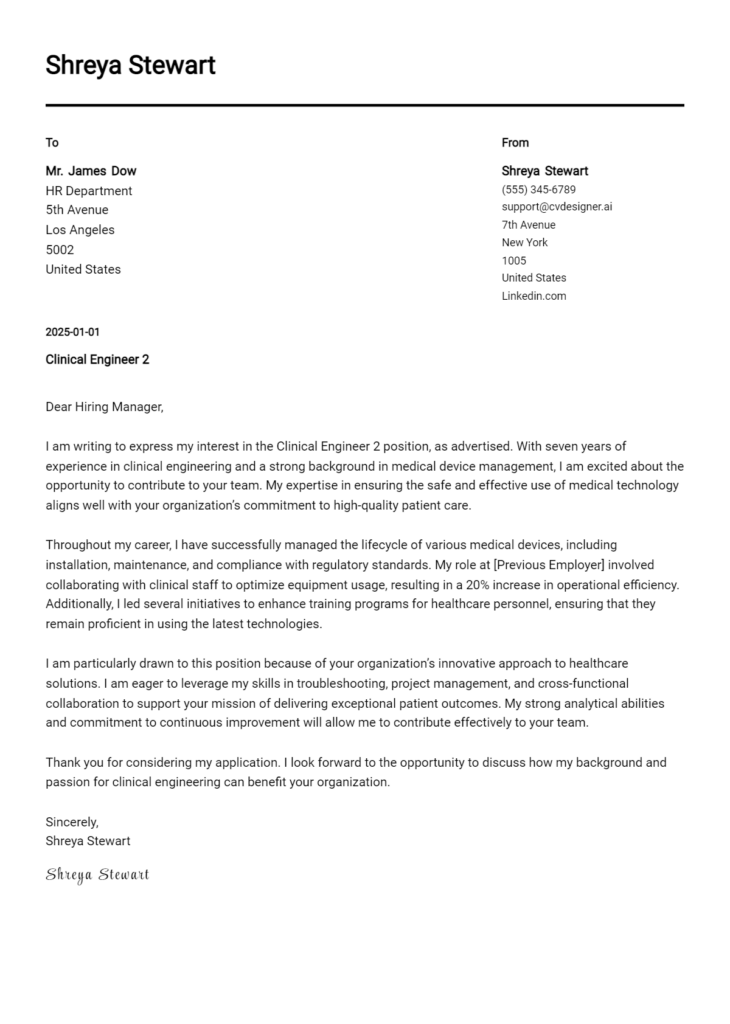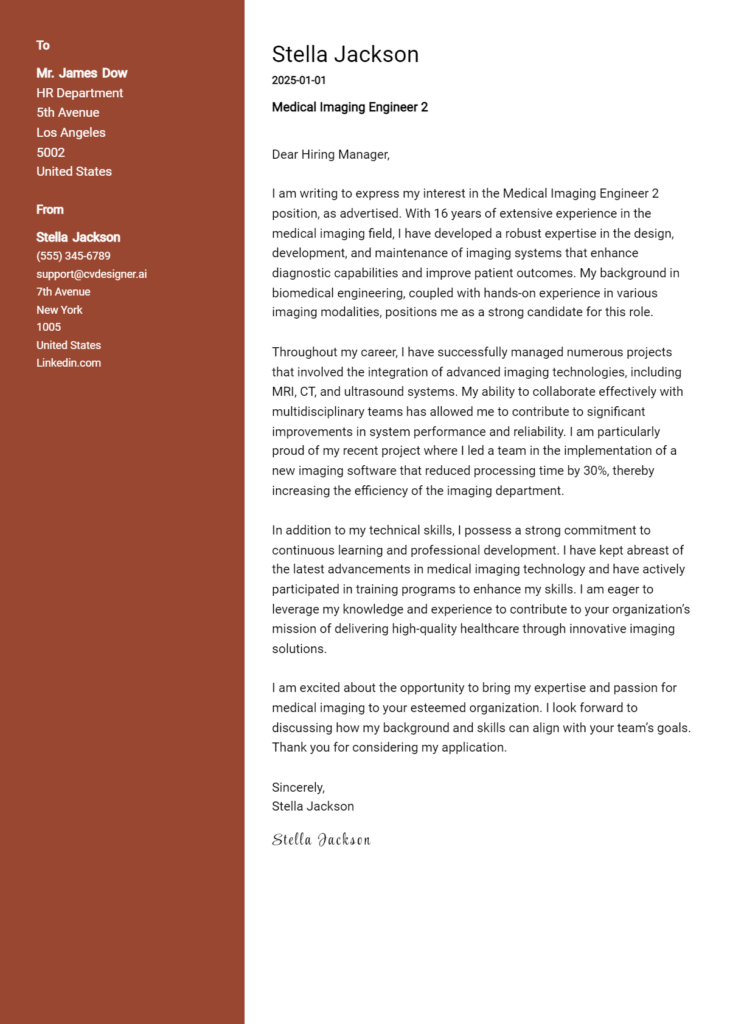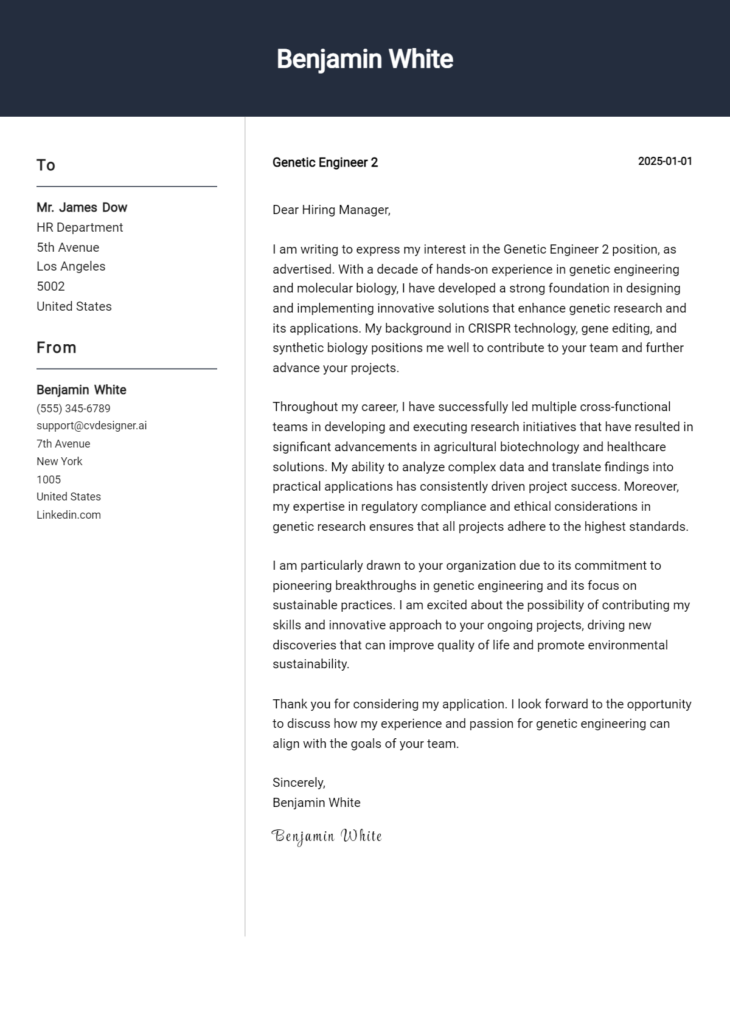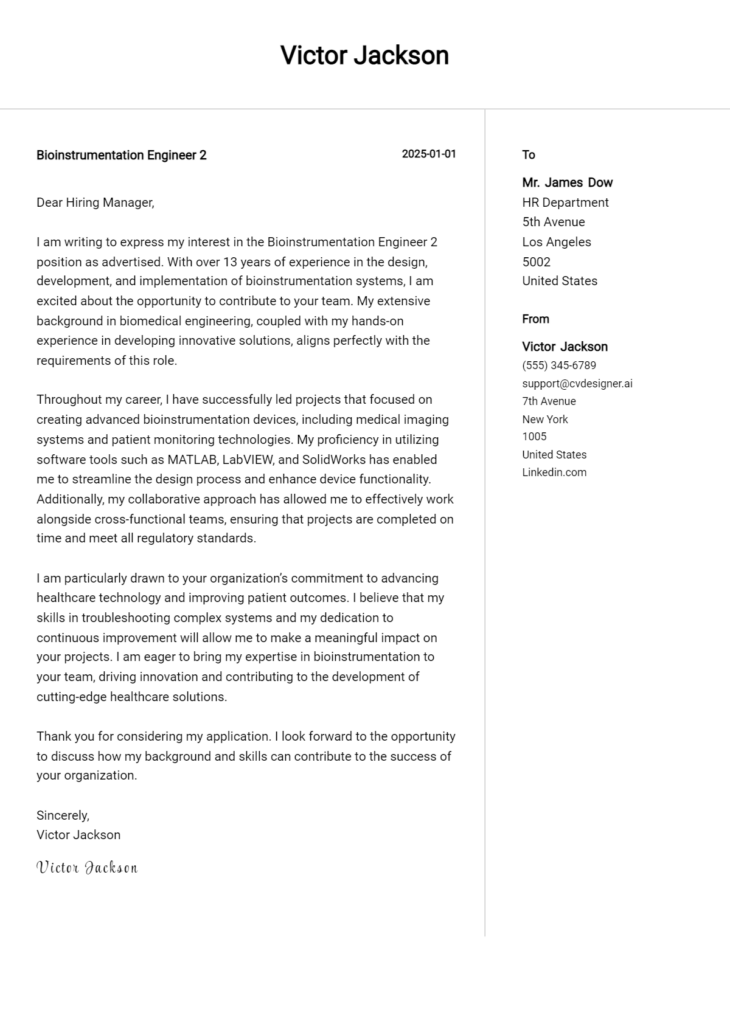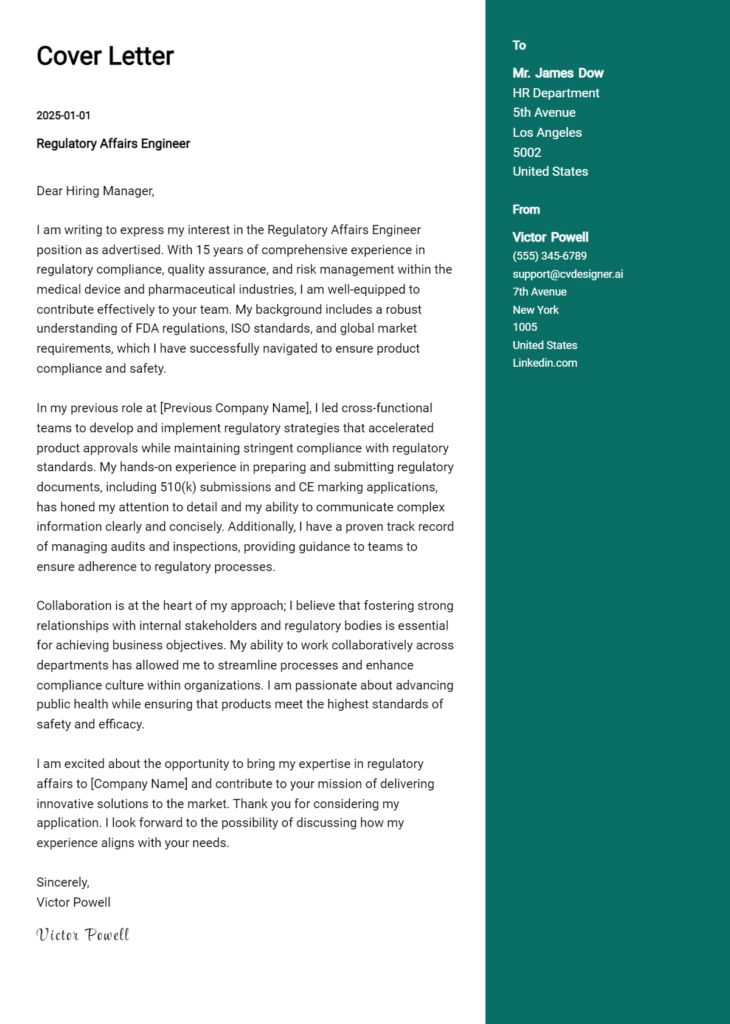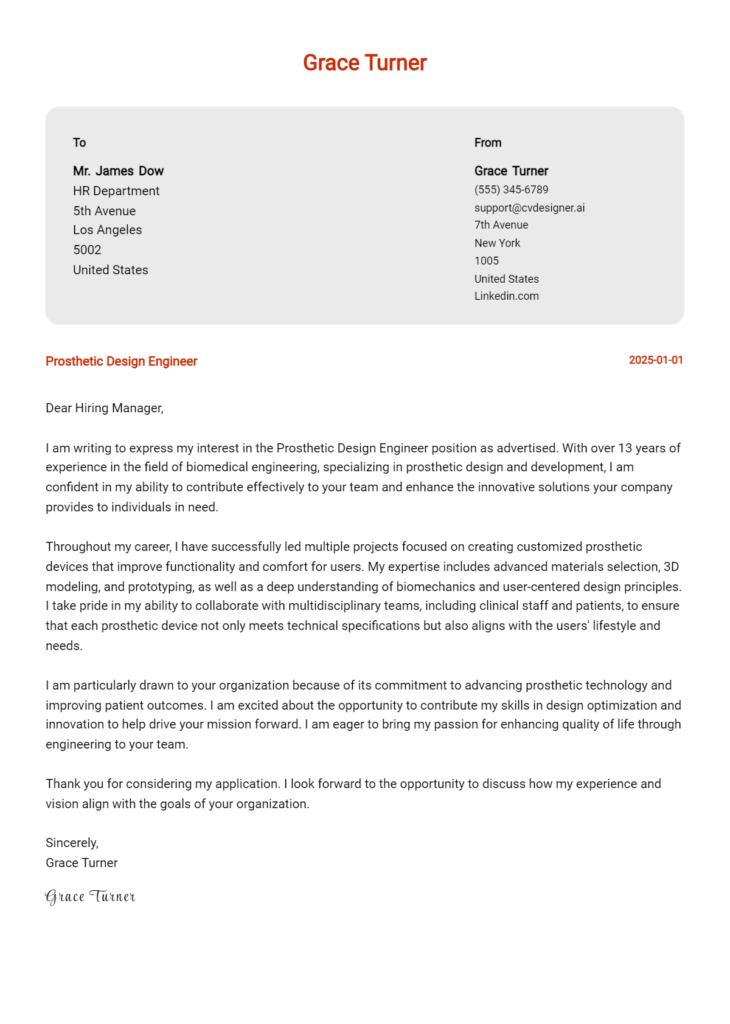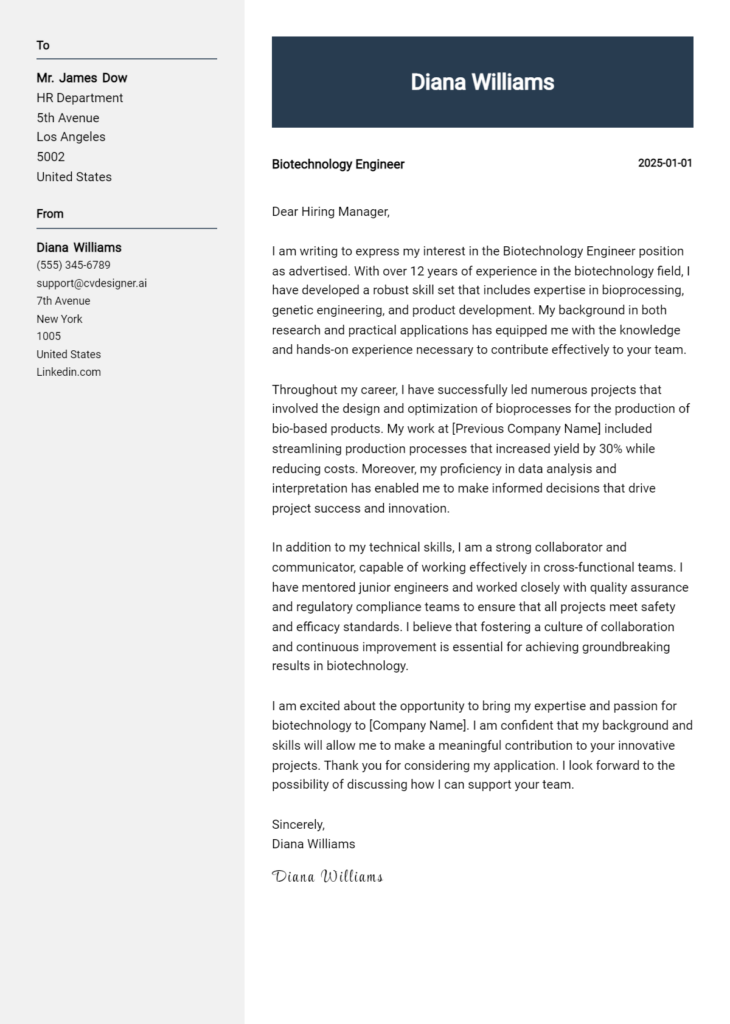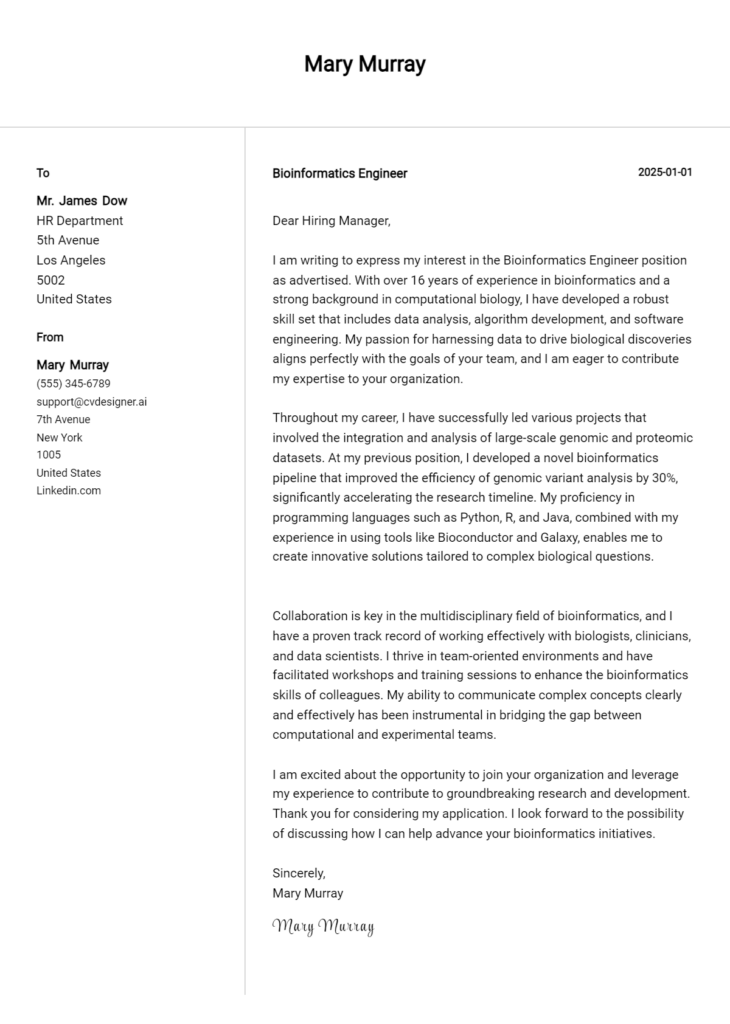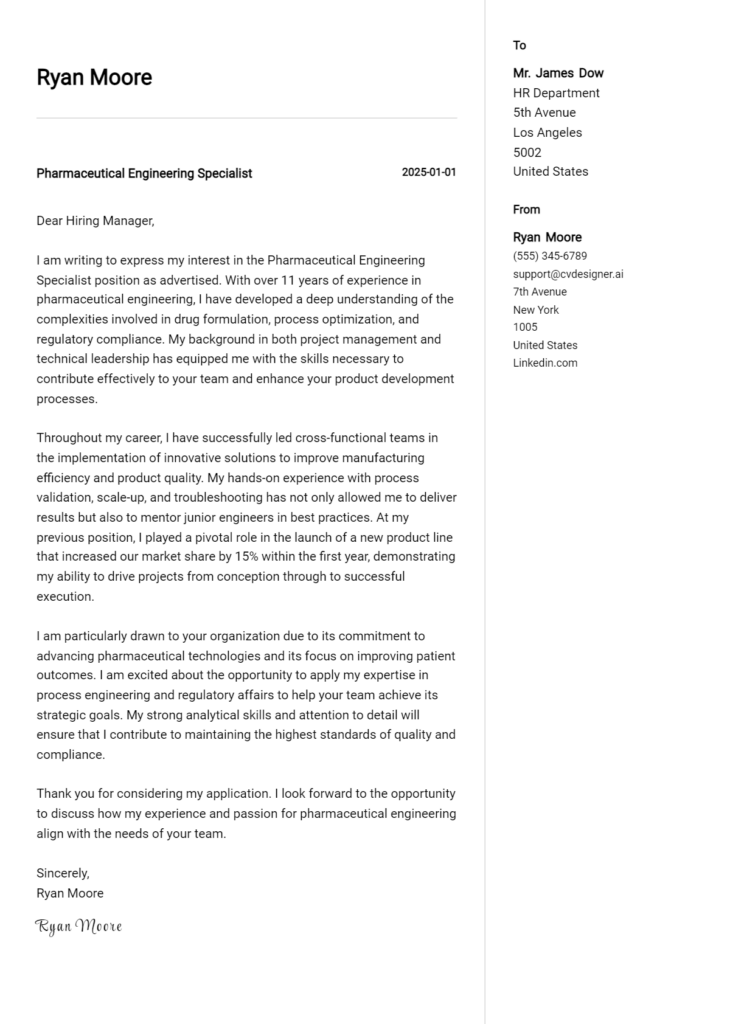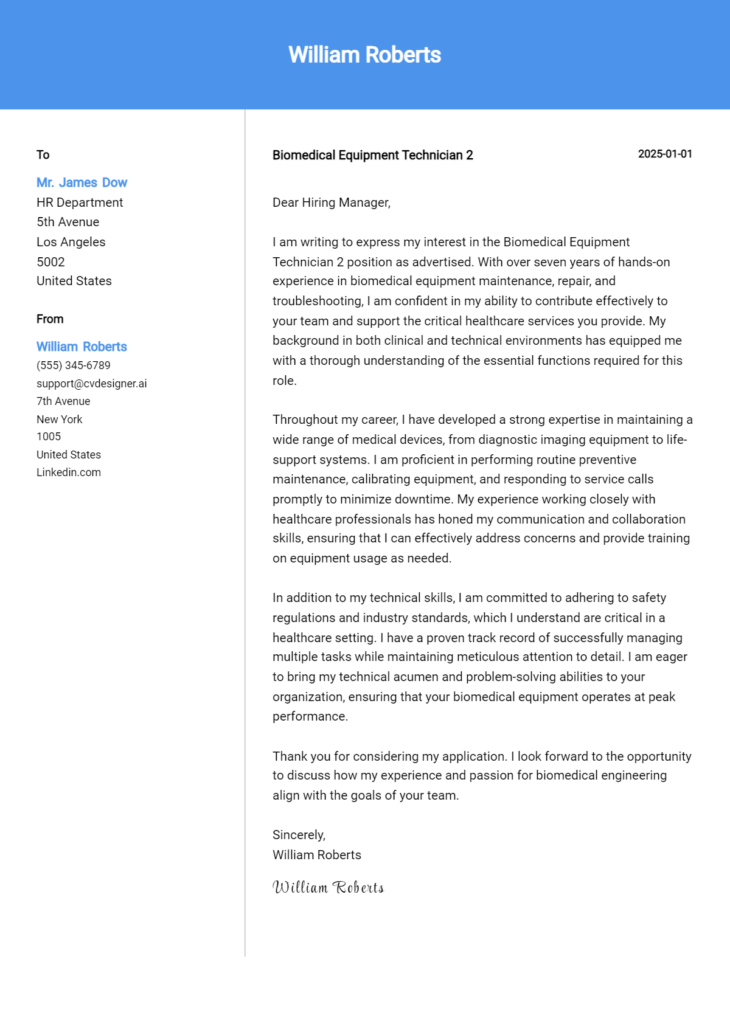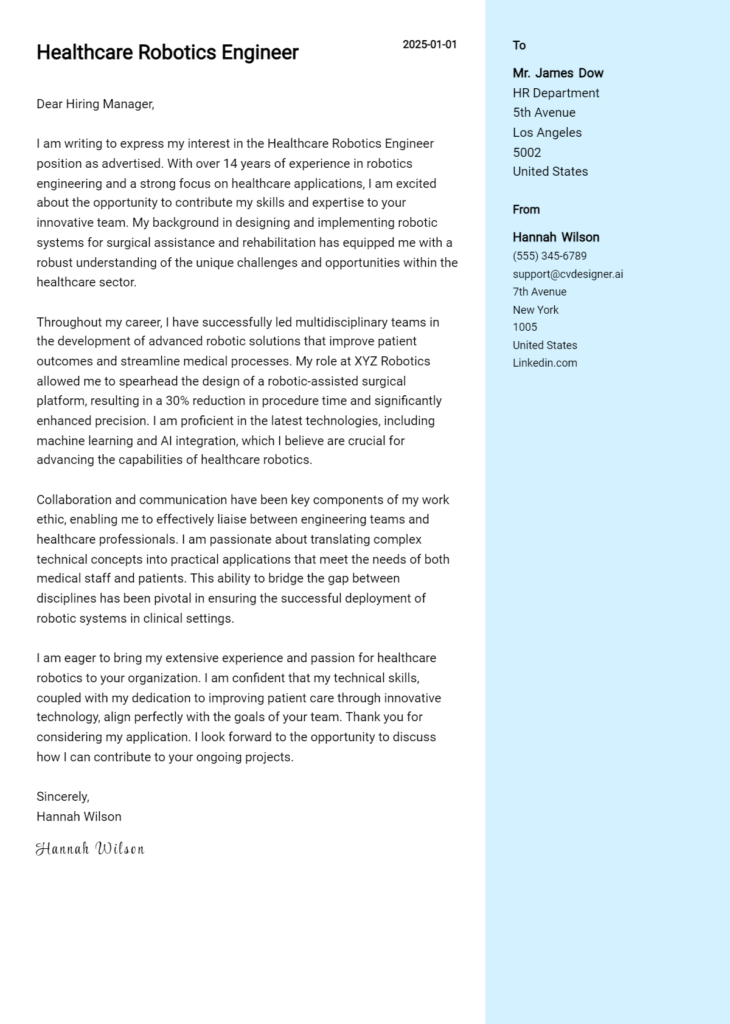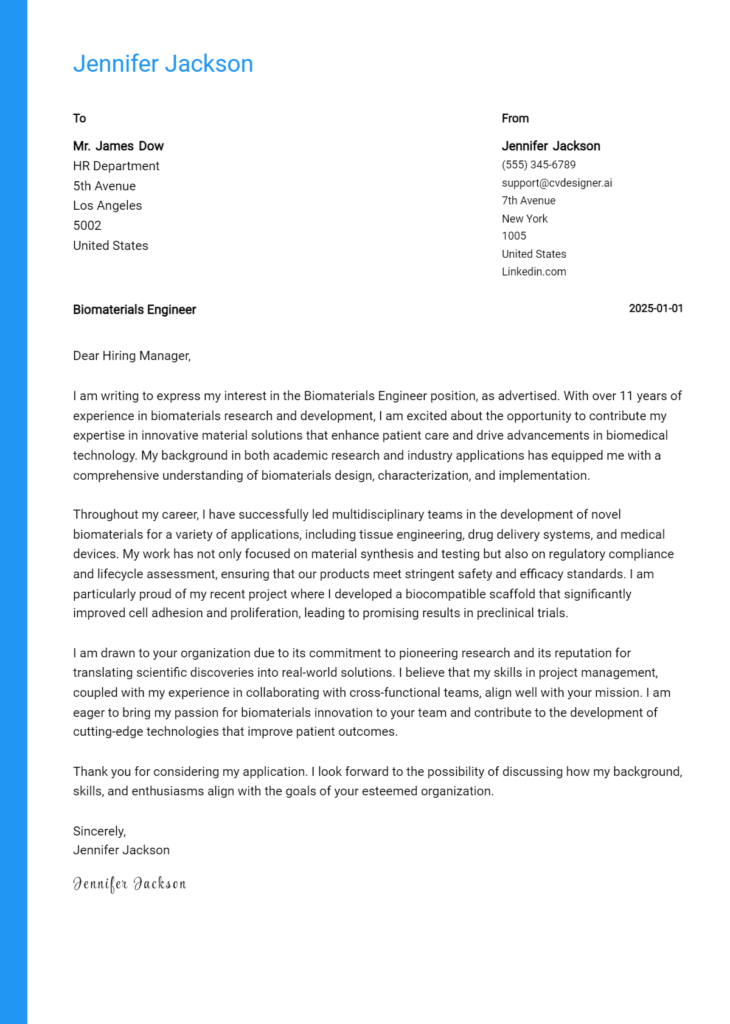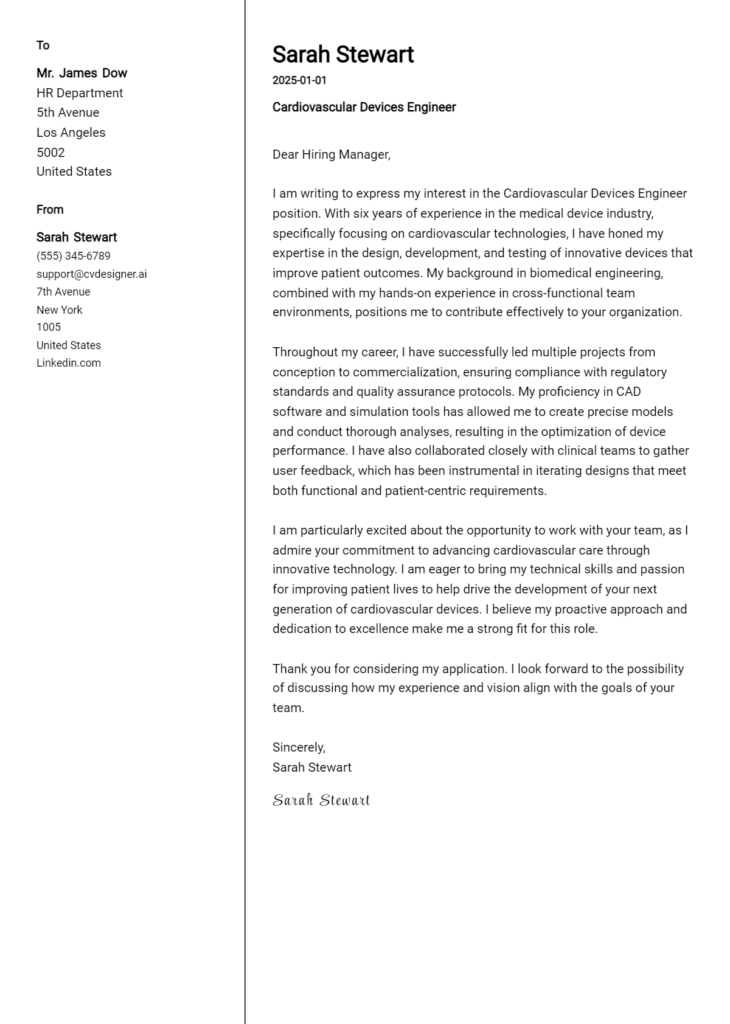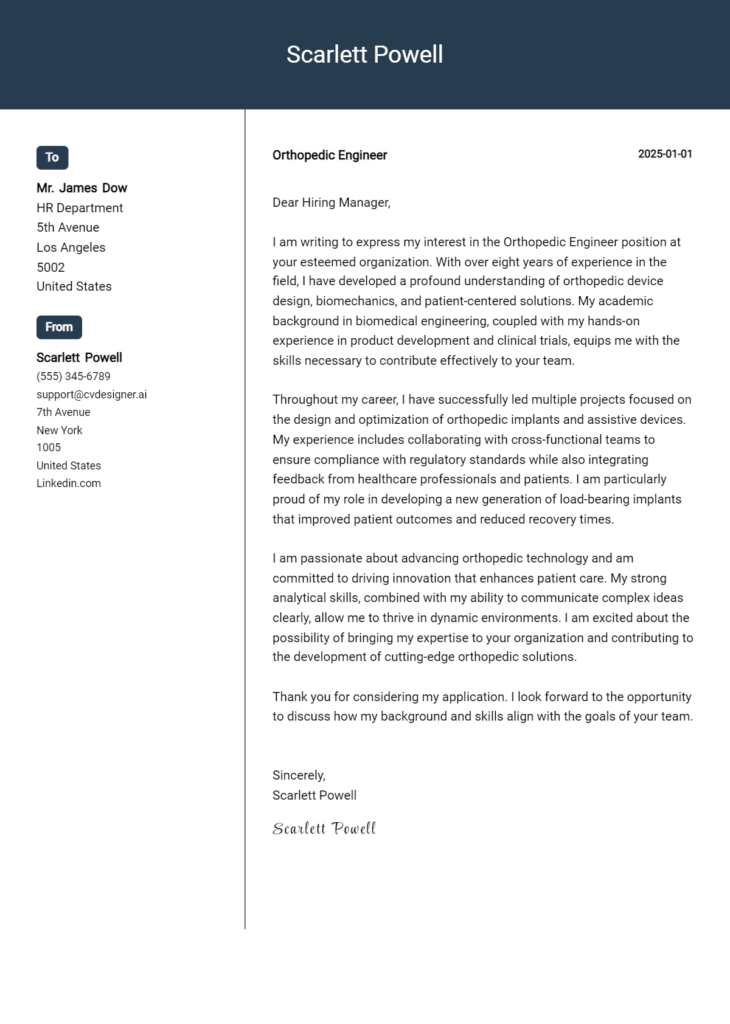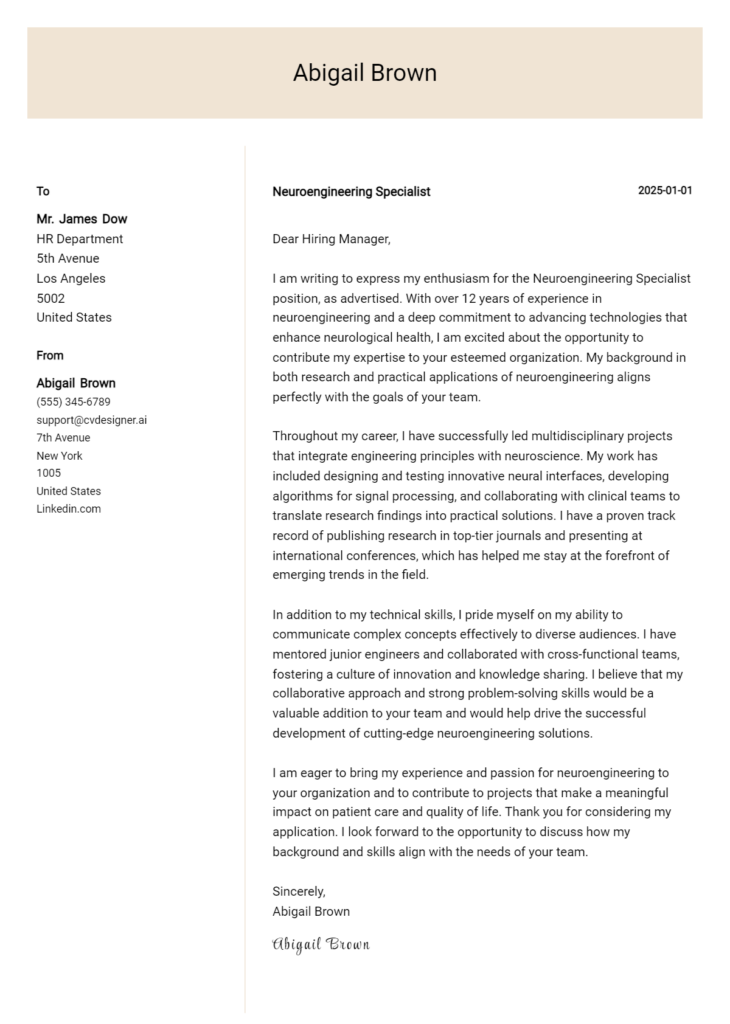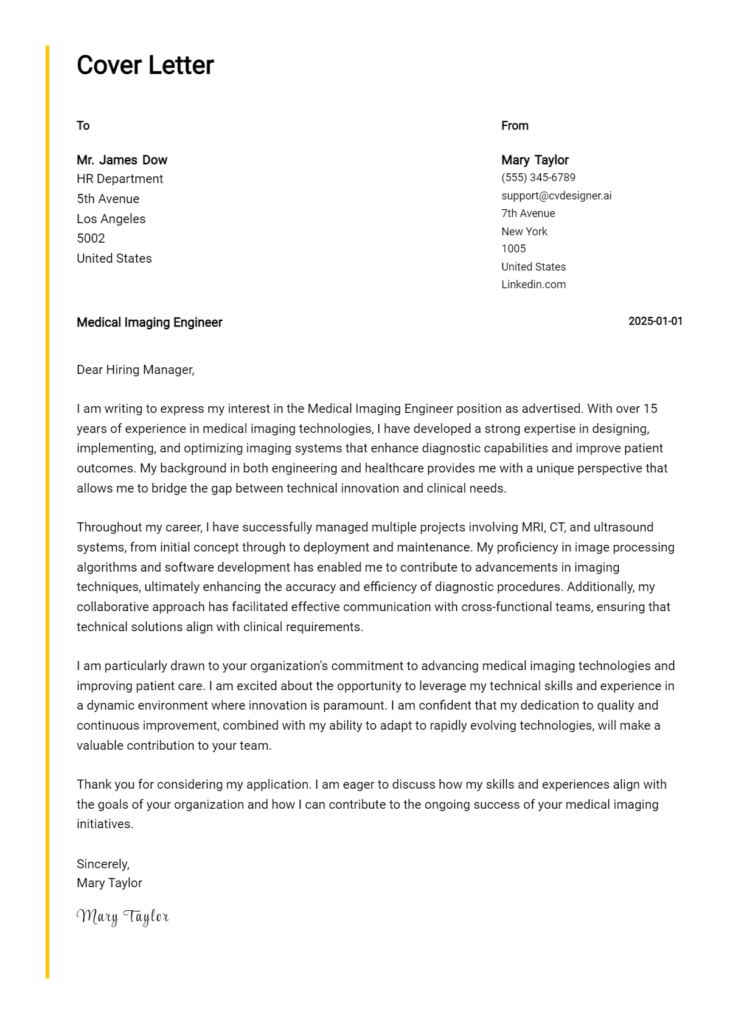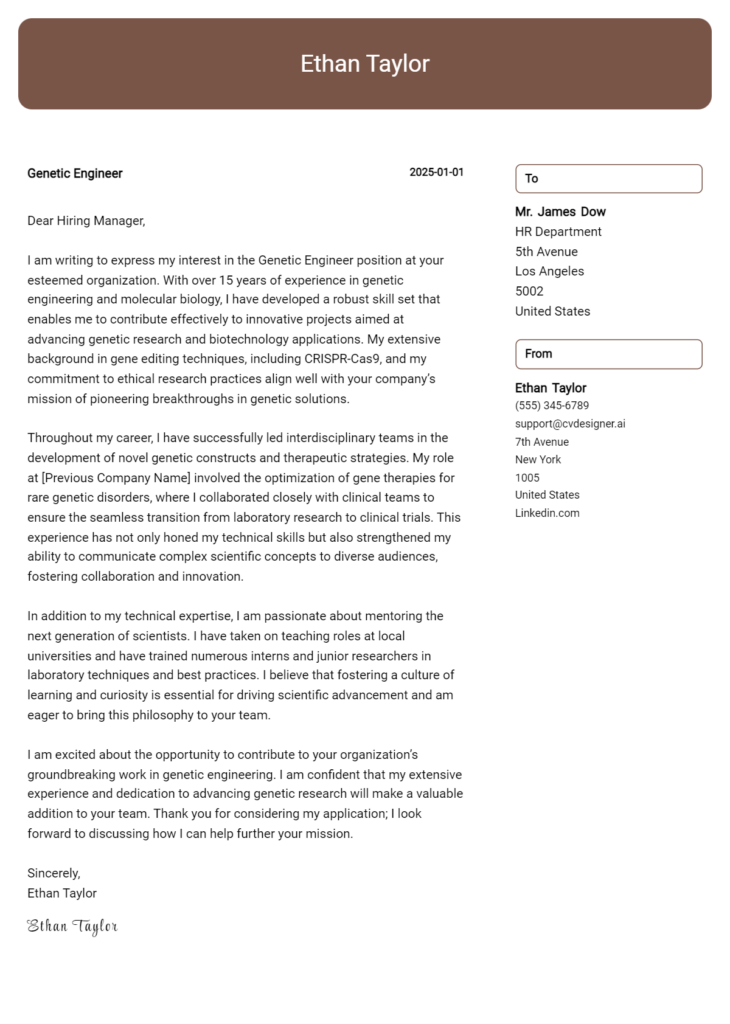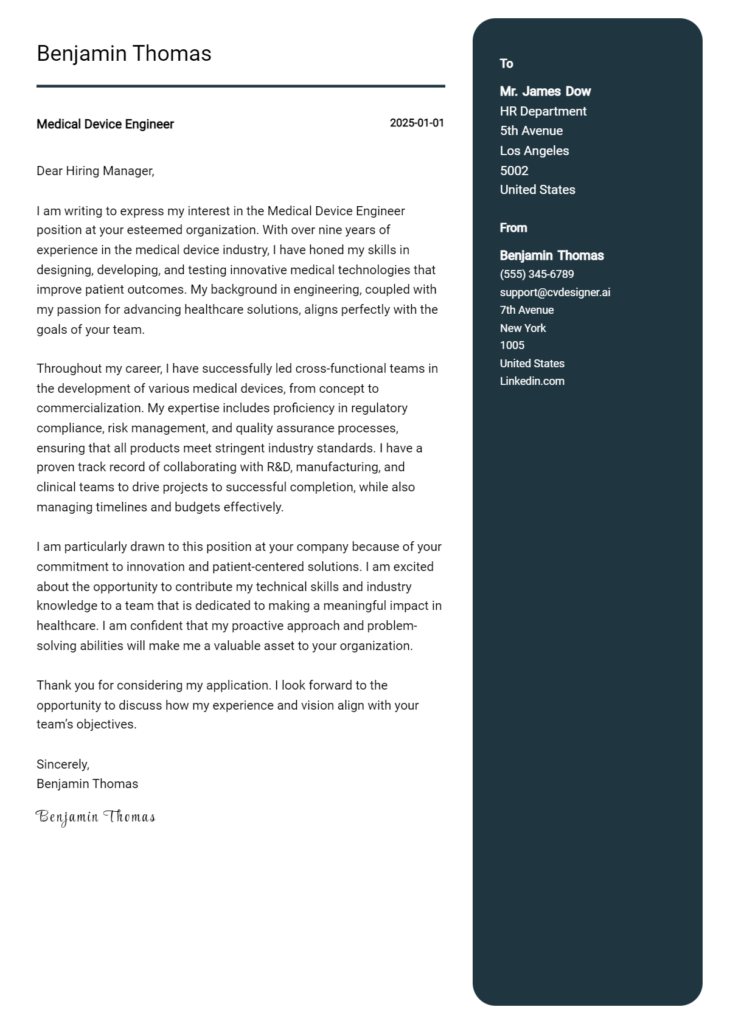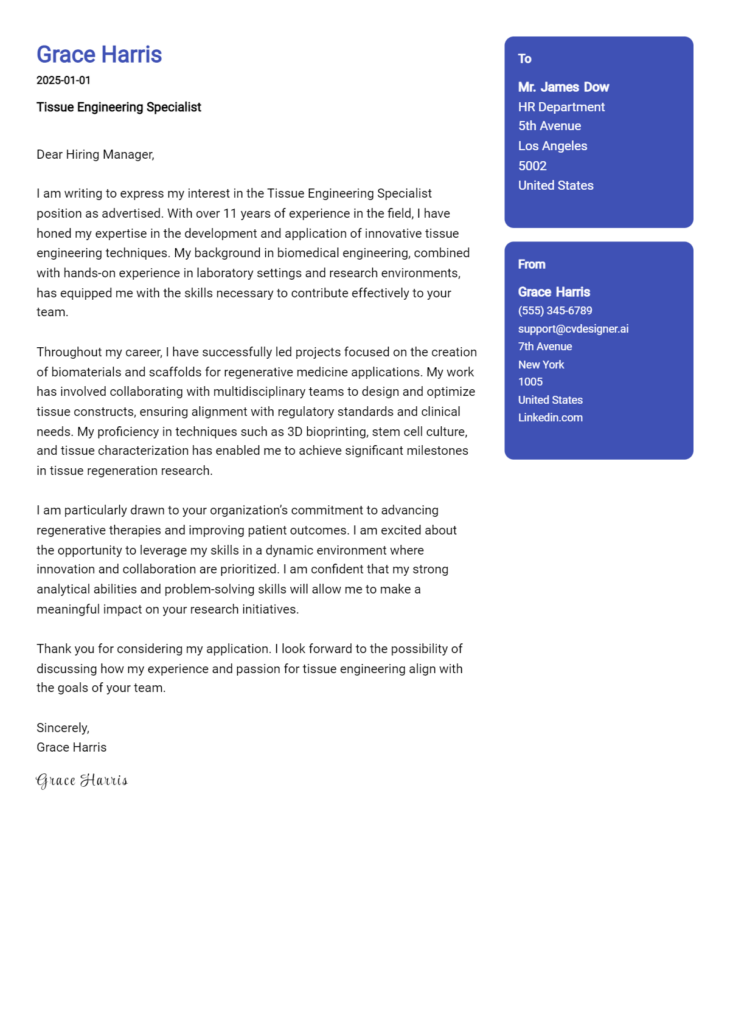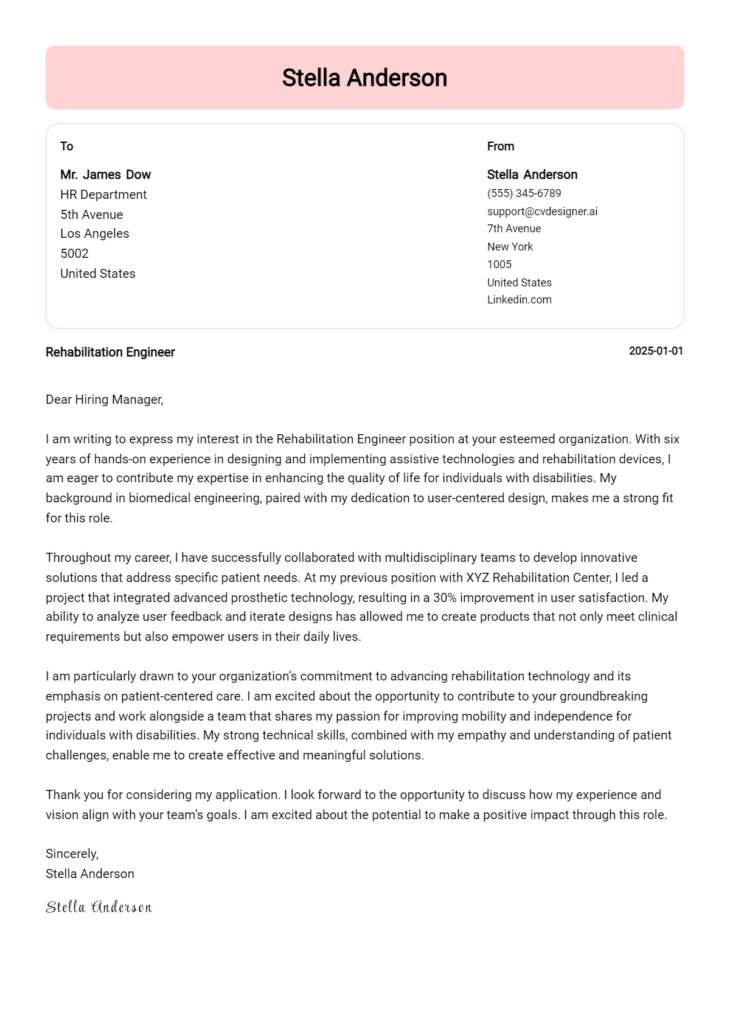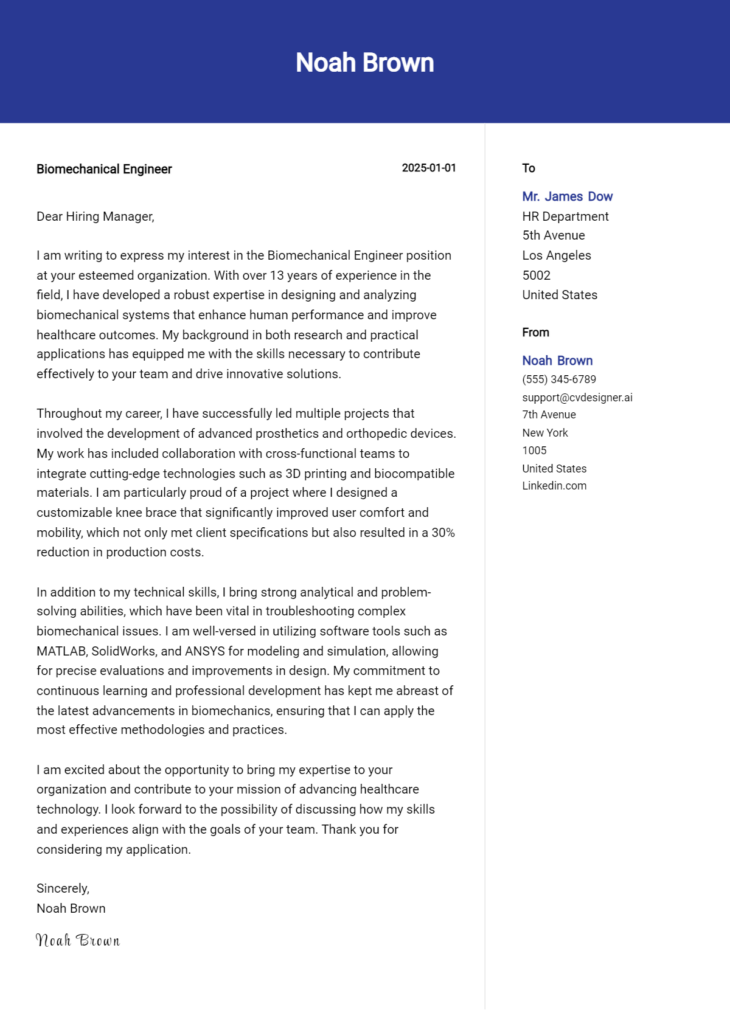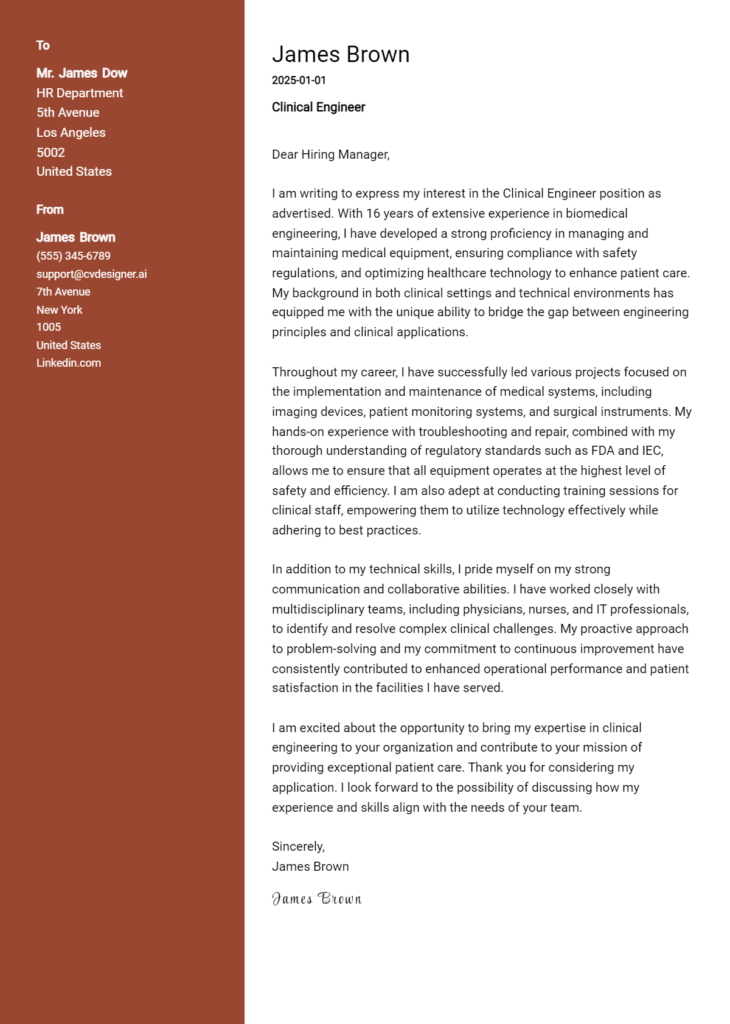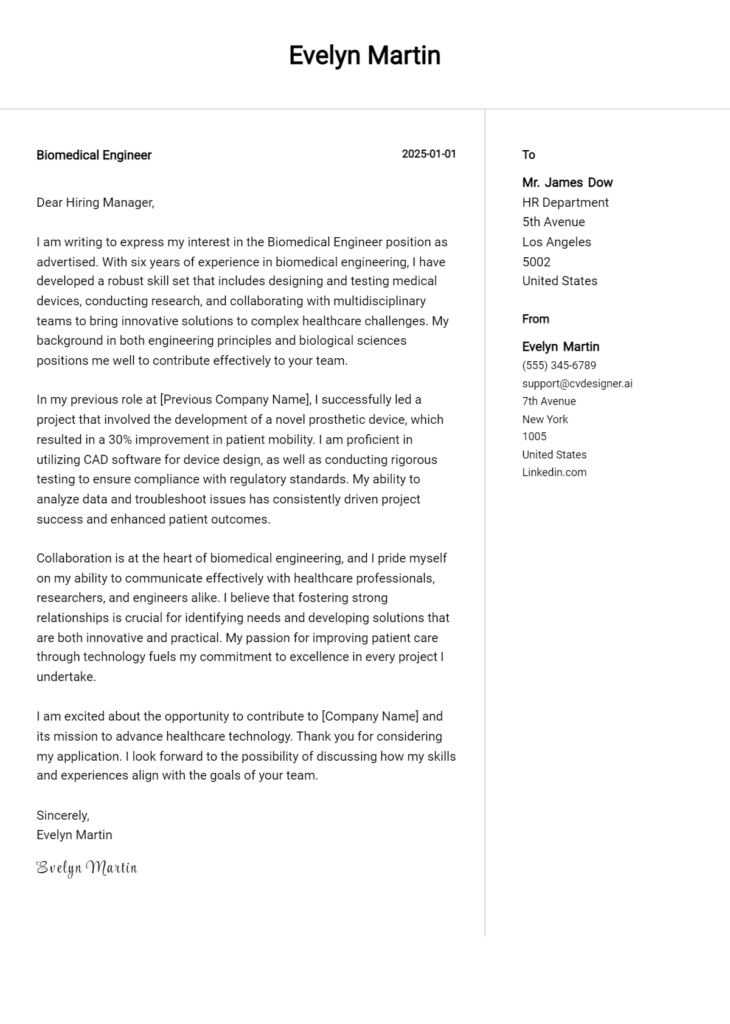Bioinstrumentation Engineer Cover Letter Examples
Explore additional Bioinstrumentation Engineer cover letter samples and guides and see what works for your level of experience or role.
How to Format a Bioinstrumentation Engineer Cover Letter?
Crafting a compelling cover letter is essential for a Bioinstrumentation Engineer, as it not only showcases your technical expertise but also reflects your ability to communicate complex ideas clearly. Given the interdisciplinary nature of bioinstrumentation, effective formatting highlights your precision and attention to detail—qualities that are critical in the engineering field. A well-structured cover letter can captivate the hiring manager's attention, emphasizing your unique qualifications and fit for the role.
In this guide, we'll discuss how to format your cover letter, providing insights and engineering-specific examples that will help you create a standout document.
We'll focus on the essential components of a professional cover letter, including:
- Cover Letter Header
- Cover Letter Greeting
- Cover Letter Introduction
- Cover Letter Body
- Cover Letter Closing
Each section is pivotal in illustrating your qualifications and professionalism. Let’s break down each part to ensure your bioinstrumentation engineer cover letter makes a lasting impression.
Importance of the Cover Letter Header for a Bioinstrumentation Engineer
The header of a cover letter is crucial as it sets the tone for the entire document and provides essential information at a glance. It should be clear and professional, containing your contact information, the date, and the recipient's details. A well-structured header reflects attention to detail and professionalism, which are vital traits for a Bioinstrumentation Engineer tasked with the precision of medical instruments. A strong header not only facilitates easy communication but also makes a great first impression on potential employers.
Strong Example
John Doe 1234 Innovation Drive Tech City, ST 12345 john.doe@email.com (123) 456-7890 October 1, 2023 Dr. Jane Smith Hiring Manager BioTech Solutions 5678 Research Blvd Science Town, ST 67890
Weak Example
john doe 1234 innovation drive tech city, st 12345 10/1/23 jane smith BioTech Solutions 5678 Research Blvd
The Importance of a Cover Letter Greeting for a Bioinstrumentation Engineer
The greeting of your cover letter plays a crucial role in establishing the tone for the rest of your correspondence. It sets the stage for a professional introduction and showcases your attention to detail and respect for the recipient. By directly addressing the hiring manager, you demonstrate a level of personalization that can make your application stand out in a competitive job market. Avoiding generic greetings, such as "To Whom It May Concern," can significantly enhance the effectiveness of your cover letter. Instead, take the time to research the hiring manager's name and title; this effort reflects your genuine interest in the position and the organization.
Here are examples of strong and weak greetings for a Bioinstrumentation Engineer cover letter:
Strong Greeting Example
Dear Dr. Jane Smith,
Weak Greeting Example
To Whom It May Concern,
The Importance of a Compelling Cover Letter Introduction for a Bioinstrumentation Engineer
The introduction of a cover letter serves as the first impression for potential employers and is a critical component in the job application process. For a Bioinstrumentation Engineer, this introduction should effectively capture the hiring manager's attention, convey genuine interest in the role, and highlight relevant skills or achievements that set the candidate apart. A strong introduction can entice the reader to delve deeper into the application, while a weak one may lead to a quick dismissal. Below are examples that illustrate the difference between a strong and weak cover letter introduction.
Strong Example
Dear [Hiring Manager's Name], As an accomplished Bioinstrumentation Engineer with over five years of experience in developing innovative medical devices, I was excited to discover the opening at [Company Name]. My passion for merging engineering principles with biological sciences has driven me to design groundbreaking bio-sensors that have improved patient outcomes in clinical settings. I am eager to bring my expertise in signal processing and my commitment to enhancing healthcare technology to your dynamic team.
Weak Example
To Whom It May Concern, I am writing to apply for the Bioinstrumentation Engineer position. I have a degree in engineering and some experience in the field. I believe I would be a good fit for the job, but I’m not sure what else to say.
Purpose of the Cover Letter Body for a Bioinstrumentation Engineer
The cover letter body serves as a critical component for a Bioinstrumentation Engineer, providing an opportunity to highlight the candidate's relevant skills, experiences, and unique value to the prospective employer. This section allows the candidate to detail specific projects or accomplishments that showcase their expertise in the field, such as the development of novel biosensors or successful collaborations with multidisciplinary teams to enhance medical device performance. By illustrating how their background aligns with the company's goals, the candidate can effectively communicate their potential contributions and fit within the organization.
Strong Example
Dear Hiring Manager, I am excited to apply for the Bioinstrumentation Engineer position at XYZ Medical Devices. In my previous role at ABC Biotech, I led a team in the development of a novel biosensor that improved glucose monitoring accuracy by 30%, resulting in a patent that not only enhanced our product line but also contributed to a significant increase in market share. My experience with integrating microfluidics and signal processing has equipped me with the skills to innovate and optimize existing bioinstrumentation systems. I am particularly drawn to XYZ's commitment to advancing patient care through technology, and I am eager to bring my expertise in biomedical engineering to your team. Thank you for considering my application. Best regards, John Doe
Weak Example
Dear Hiring Manager, I am writing to express my interest in the Bioinstrumentation Engineer position. I have worked in engineering for several years and have some experience with medical devices. I hope to use my skills at your company because it seems like a good place to work. I have completed some projects, but I can't remember the details right now. I believe I could be a good fit for the team. Sincerely, Jane Smith
Importance of the Cover Letter Closing for a Bioinstrumentation Engineer
The closing paragraph of a cover letter is crucial as it serves to summarize your qualifications, reiterate your enthusiasm for the position, and encourage the hiring manager to take the next steps, such as reviewing your resume or scheduling an interview. A strong closing leaves a lasting impression and reinforces your suitability for the role, while a weak closing may fail to convey your eagerness and professionalism, potentially diminishing your chances of being considered.
Strong Example
Thank you for considering my application for the Bioinstrumentation Engineer position. With a robust background in biomedical engineering and a passion for developing innovative diagnostic tools, I am excited about the opportunity to contribute to your team. I believe my skills in data analysis and instrumentation design align well with your needs. I look forward to the possibility of discussing how my experience can benefit your organization. Please feel free to review my attached resume and contact me to schedule an interview at your convenience.
Weak Example
Thanks for reading my letter. I think I would be okay for this job because I have some experience. It would be nice to talk about it if you want. Please look at my resume or something.
Crafting an effective cover letter is crucial for candidates seeking a Bioinstrumentation Engineer position. Your cover letter serves as your first impression, allowing you to highlight your technical skills, problem-solving abilities, and understanding of the software development life cycle (SDLC). Additionally, showcasing your teamwork experience and passion for continuous learning can set you apart from other applicants. Here are some tips to help you create a compelling cover letter tailored to this specialized field.
Tips for Writing a Cover Letter for a Bioinstrumentation Engineer
Highlight Your Technical Skills
Clearly outline your technical proficiency in bioinstrumentation technologies, programming languages, and relevant software. Use specific examples from your previous experiences to demonstrate how these skills have positively impacted projects. This not only showcases your expertise but also reinforces your suitability for the role.Demonstrate Problem-Solving Abilities
Bioinstrumentation engineers often face complex challenges. In your cover letter, provide a brief narrative of a specific problem you encountered and the innovative solution you implemented. This illustrates your analytical thinking and ability to navigate obstacles in a technical environment.Showcase Your Knowledge of the SDLC
As a Bioinstrumentation Engineer, familiarity with the software development life cycle is essential. Discuss your experience with different phases of the SDLC, such as requirements gathering, design, development, testing, and deployment. This demonstrates that you not only possess technical skills but also understand the broader context of project development.Emphasize Teamwork and Collaboration
Engineering projects often require collaboration across various disciplines. Highlight your experience working in teams, focusing on how you contributed to group success, facilitated communication, or resolved conflicts. This conveys your ability to work effectively in a collaborative environment, which is vital for most engineering roles.Express Your Passion for Continuous Learning
The field of bioinstrumentation is constantly evolving. Share your commitment to staying updated with the latest advancements through courses, certifications, or professional organizations. This shows potential employers that you are proactive and dedicated to personal and professional growth, making you a valuable asset to their team.
For additional resources, consider exploring cover letter templates or utilizing a cover letter builder to streamline your writing process. These tools can help you create a polished and professional cover letter that effectively communicates your qualifications.
Common Mistakes to Avoid in a Bioinstrumentation Engineer Cover Letter
Crafting a compelling cover letter is essential for a Bioinstrumentation Engineer seeking to stand out in a competitive job market. Common mistakes can undermine your chances of making a positive impression. Here are some pitfalls to avoid:
Generic Content: Many applicants use a one-size-fits-all approach. Tailor your cover letter to the specific job and company. Research the organization and mention how your skills align with their mission.
Lack of Specific Examples: Failing to cite specific experiences can make your qualifications seem vague. Use concrete examples of your work, such as projects or achievements, to illustrate your expertise in bioinstrumentation.
Ignoring Formatting Guidelines: A cluttered or unprofessional layout can detract from your message. Follow a clear cover letter format to ensure readability and professionalism.
Overly Technical Language: While it's important to demonstrate technical knowledge, using excessive jargon can alienate your readers. Opt for clear, concise language that effectively communicates your skills without overwhelming the reader.
Neglecting Proofreading: Typos and grammatical errors can signal a lack of attention to detail. Always proofread your cover letter multiple times, and consider asking a peer to review it as well.
Not Addressing the Hiring Manager: Using a generic greeting like "To Whom It May Concern" can seem impersonal. Take the time to find out the name of the hiring manager and address them directly.
Failure to Follow Instructions: Many employers specify guidelines for application submissions. Ignoring these instructions can reflect poorly on your ability to follow directions. Always ensure you adhere to any provided requirements.
By avoiding these mistakes and adhering to best practices, you can craft a strong cover letter that enhances your chances of landing an interview. For additional guidance, check out these cover letter examples to inspire your writing.
Cover Letter FAQs for Bioinstrumentation Engineer
What should I include in my cover letter as a Bioinstrumentation Engineer?
In your cover letter, highlight your relevant educational background, such as a degree in biomedical engineering or a related field. Emphasize your technical skills, particularly in instrumentation design, signal processing, and software integration. Discuss specific projects or experiences where you successfully developed or improved bioinstrumentation systems, showcasing your problem-solving abilities. It's also beneficial to mention any familiarity with regulations and standards in the medical device industry, such as FDA guidelines. Finally, convey your enthusiasm for the role and how your skills align with the company's mission and projects, demonstrating your genuine interest in contributing to their goals.
How can I tailor my cover letter for a specific job application?
To tailor your cover letter, start by researching the company and the specific job role. Identify key responsibilities and required skills mentioned in the job description, and reflect on your experiences that align with them. Use keywords from the job posting to make your cover letter more relevant. For instance, if the job emphasizes experience with specific bioinstrumentation technologies, detail your hands-on work with those technologies in your cover letter. Additionally, mention any shared values or goals with the company, as this shows that you've done your homework and are genuinely interested in being a part of their team.
Should I include technical jargon in my cover letter?
Using technical jargon in your cover letter can be beneficial, but it should be balanced with clarity. Include specific terms related to bioinstrumentation, such as "biosensors," "signal processing," and "data acquisition systems," to demonstrate your expertise and familiarity with the field. However, avoid overwhelming the reader with overly complex terminology that may obscure your main points. Aim for a tone that is professional yet accessible, ensuring that your passion for bioinstrumentation comes through without alienating non-technical readers, such as HR personnel. Tailor the complexity of the language based on the audience you expect to read your cover letter.
How long should my cover letter be?
Your cover letter should ideally be one page long, typically comprising three to four paragraphs. This length is sufficient to introduce yourself, express your interest in the position, and highlight key experiences and skills relevant to the role of a Bioinstrumentation Engineer. Aim for concise, impactful sentences that engage the reader without unnecessary fluff. Each paragraph should serve a purpose: an introduction that captures attention, a body that elaborates on your qualifications, and a closing that reinforces your eagerness for the position. Keeping it to one page ensures you respect the hiring manager's time while providing enough information to make a compelling case for your candidacy.
Build your Cover Letter in minutes
Use an AI-powered cover letter builder and have your letter done in 5 minutes. Just select your template and our software will guide you through the process.

